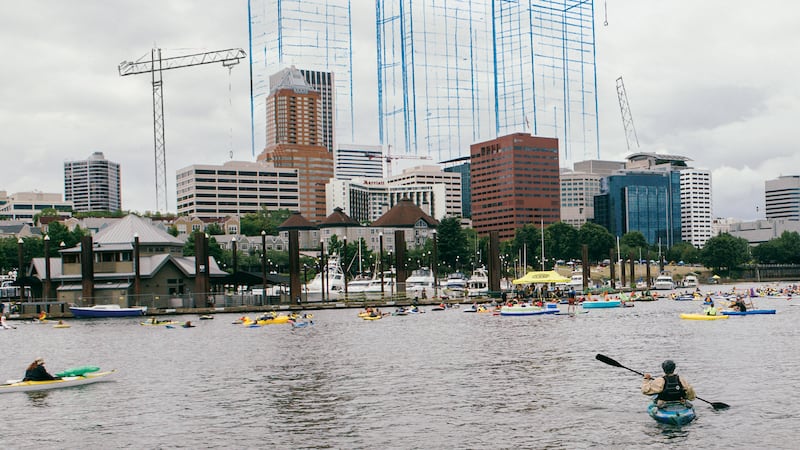Few civic changes anger Portlanders like the threat of tall buildings blocking familiar views.
Now a Portland-based real estate investment and development company has arrived at City Hall with a proposal to crowd the skyline with skyscrapers as tall as 40 stories on the downtown waterfront.
In exchange, it's offering to build up to 500 affordable apartments with no public cash. All it wants is the rights to the sky.
It's by far the largest proposal floated under the city's new inclusionary housing policy, which requires developers to set aside affordable units in projects of 20 apartments or more.
And it threatens to agitate an already heated debate over how high Portland's skyline can go.
Related: Sick of Portland changing? Too bad. Here are seven places where the city could go big.
Four members of the City Council, including the mayor, have expressed preliminary interest.
City Commissioner Dan Saltzman says he's "heartened" by a project pledging to use inclusionary housing. Many private developers, he says, "are saying that inclusionary housing is killing our city. Here we have a big development stepping forward and providing affordable units in a big way. That's counter to a lot of naysaying we're hearing."
The investment company bringing the proposal, NBP Capital, says it wants to build as many as eight apartment towers of at least 100 feet on the streets surrounding RiverPlace, a sleepy low-rise 1990s development along Southwest Naito Parkway that's now home to a marina, a boardwalk and flocks of Canada geese.
The height limit at RiverPlace in the latest city proposal is 200 feet. But NBP Capital wants to max out at 325 feet—plus one 400-foot tower.
The project could create 2,500 units, up to 500 of them priced to be affordable for people making 80 percent of the median income or less. (By way of comparison: Prosper Portland, the city's urban renewal agency, expects to spend millions of public dollars to build roughly the same number of apartments on the old U.S. Post Office site in Old Town.)
For seven years, the city's Planning and Sustainability Commission has been weighing a blueprint—called the Central City 2035 Plan—to allow some developers to build higher.
Raising height limits allows more flexibility in how to build—and these developers apparently favor having open space with stunning views for their own buildings.
Planning commission member Chris Smith calls the debate over height limits the "Vancouver-versus-Paris debate"—Vancouver, B.C., epitomizes the tall towers approach, and Paris the lower heights.
"There is a strong set of voices in the debate advocating for limiting heights even below what exists," says Smith. "The anti-height voices did not get a lot of traction, even though I think we tried to listen very carefully."
The loudest anti-height voice in City Hall is Commissioner Amanda Fritz, who has called for a case-by-case review of many of the height increases proposed under the Central City Plan.
Fritz did not respond to WW's requests for comment on whether the affordable apartments offered by the RiverPlace proposal would sway her to accept higher height limits.
NBP Capital first presented city planners with a proposal in August 2016. But the investment group dramatically expanded its ambitions after the City Council passed its inclusionary housing policy, which includes density incentives for affordable units.
The project's backers have deep pockets.
NBP Capital says its portfolio is worth a half-billion dollars. The company was founded by the brother-sister team of Lauren Noecker Robert and Spencer Noecker. It is majority-owned by investors for the trust of a German-American dual citizen and philanthropist Nicolas Berggruen. Berggruen was nicknamed the "homeless billionaire" for having no base of operations and living in hotels.
The developers and architect declined to answer questions about their plans. But opposition to new tall towers isn't going away.
"I fear what would happen if more older structures were to be torn down and replaced with tall buildings," a West End resident named David Dixon testified to the City Council on Sept. 7. "Would my walks become more perilous through Pearl District-like traffic, sunless wind tunnels and cold concrete and glass storefronts?"
